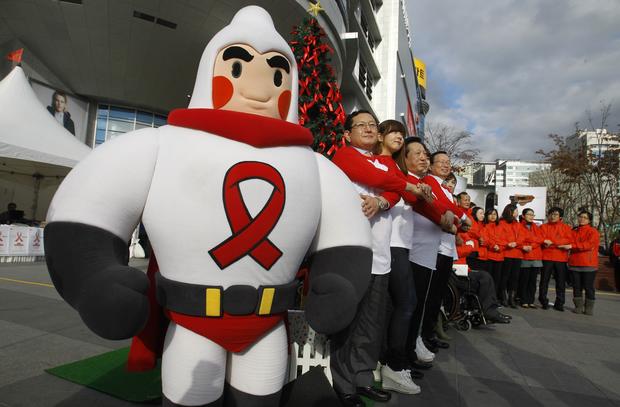S. Korea HIV patients battle AIDS, and bias
This story was filed by CBS News' Audrey Yoo, in Seoul
On Monday, UNAIDS appointed Hong Myung-bo, one of South Korea's most famous soccer players, as an International Goodwill Ambassador to raise awareness on HIV/AIDS in Korea and the rest of Asia.
His appointment is promising news because people living with the disease in Korea are fighting an uphill battle against intangible forces that cannot be conquered with medicine and money alone.
As of December 2010, about 7,200 people in Korea were known to be living with the human immunodeficiency virus that causes AIDS, according to the Korea Centers for Disease Control and Prevention. In a country with a population of almost 49 million that means just 0.015% of South Koreans are living with HIV.
However, experts estimate that the actual number of people who live with the virus may be five to ten times greater than the official count.
New HIV treatment shows 100% protection in mice; Humans nextVideo: Where the U.S. stands on treating AIDS
AIDS cases in China projected to hit 780,000
Widespread misconceptions, stigma, and discrimination surrounding the illness have pushed HIV patients to the fringes of Korean society, say experts and activists. The fear of being exposed and ostracized is strong.
Although the health ministry covers virtually all treatment costs for HIV-positive Koreans, it's believed that some refuse the benefits because they would have to reveal their status and identity to the government.
Public discussion about HIV/AIDS is uncommon, and attempts to interview people who live with the virus illustrate the isolation of the HIV community.
Two of the main AIDS-related non-profit organizations in South Korea - the Korean Alliance to Defeat AIDS and the Korea Federation of HIV/AIDS Prevention - both declined CBS News' request to be put in contact with HIV patients. Multiple smaller advocacy groups also declined the request.
Finally, via the Salvation Army's Red Ribbon Center in Seoul, a man who asked to be identified only by his last name, Lee, agreed to discuss the stigma of the disease with CBS News.
Lee, who has a strong build and a square jaw at 43 years of age, was diagnosed HIV-positive in 2004. Like almost all cases of HIV among Koreans, he got the virus through sexual contact.
Lee is heterosexual and has only had sex with women. He is uncertain whether he was infected while working as a tour guide in Thailand, or after he returned to Seoul.
He never told his late father or his mother, who now suffers from dementia, and only two of his five siblings know of his illness.
"Their reaction was cold," Lee recalls. "Our relationship is a bit better now that time has passed, but I feel like they don't keep in touch with me as often because of my condition. It's hard to describe how I feel."
Lee feels the same kind of discomfort when he is around his friends, although most of them know of his diagnosis. Before he was diagnosed with HIV, he would have multiple rounds of drinks with his friends after work. Now he usually comes home after the first round because he feels that his presence makes some of his friends uncomfortable.
"The hardest part is dealing with prejudice," he explains. "Even though my friends know that HIV is another chronic disease, in reality, they are subconsciously prejudiced. For example, I can tell they are hesitant to let their children interact with me."
The virus is associated with homosexuality and sexual promiscuity in Korea, both of which are taboo in Korean society. A general lack of awareness adds to the stigma and ostracism.
"A lot of people here think that HIV/AIDS is a disease that bad people get," explains researcher and activist Cho Myung-hwan. "They feel they shouldn't have to empathize with bad people. I believe that's why they shun HIV patients."
Despite increasing scientific knowledge of HIV/AIDS among the public, the disconnect between knowledge and attitudes remains palpable.
"We can know all the facts about HIV/AIDS, but it takes a long time to embrace HIV patients with an open mind," says Kim Min-dong, the director of the AIDS Counseling Support Center. "I do hope that one day everyone can speak openly about AIDS. It'll take a long time though."
Meanwhile, Lee simply wants to "live like a decent human being".
"I'd like to get married, but I'm not in the right circumstances," he says. "It would be difficult to meet an ordinary person. I would have to meet someone like myself, but I haven't met her yet. Maybe an angel will show up."
